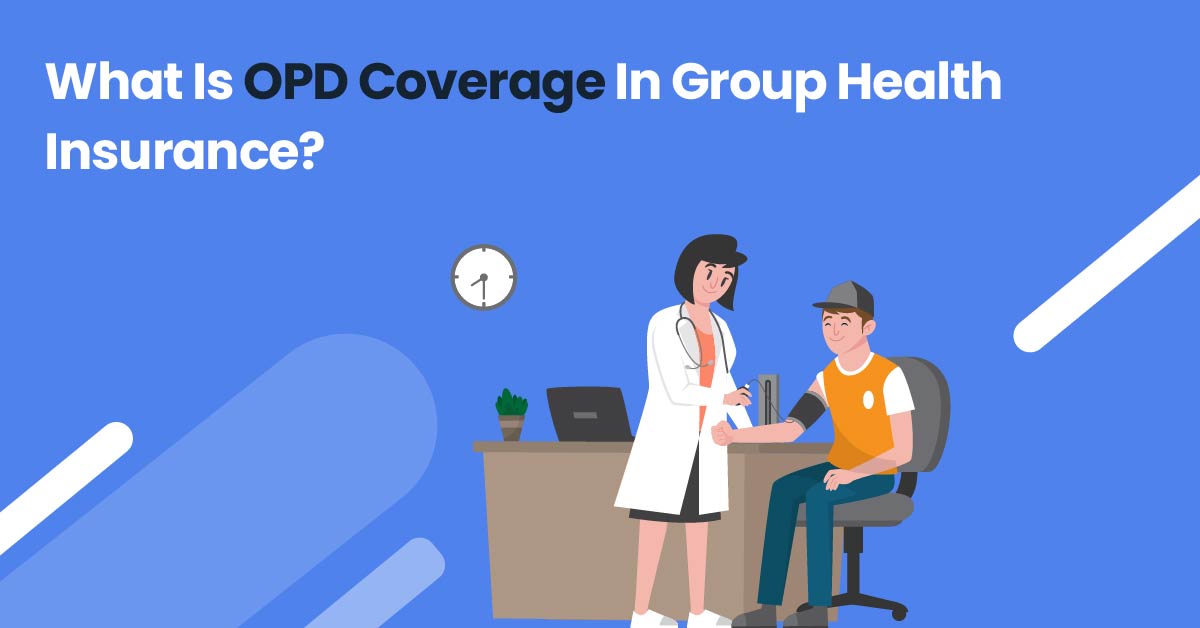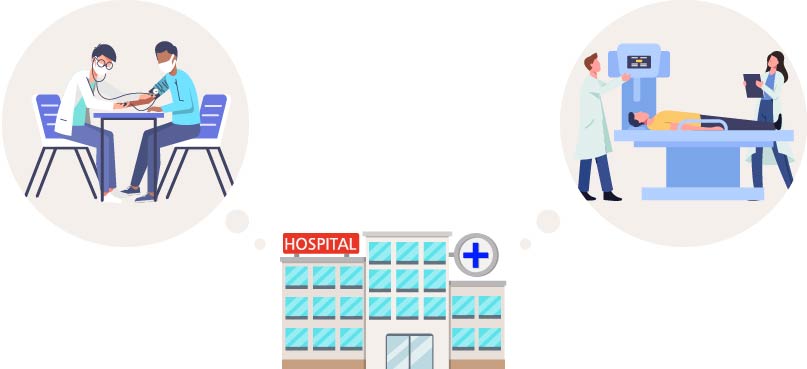
OPD stands for Outpatient Department in healthcare settings. It refers to medical treatments and services that are provided to patients who do not require an overnight stay in the hospital.
Group health insurance with OPD coverage provides financial protection to policyholders for the cost of outpatient medical treatments, including consultations with a doctor, diagnostic tests, and other medical procedures that do not require a hospital stay. The coverage is usually offered as an add-on to a comprehensive group health insurance policyAn insurance policy is a legally binding contract between an insurance company (insurer) and an individual or business (policyholder). It More and can help policyholders save money on their medical expenses and reduce the financial burden of unexpected health issues.
How does the OPD coverage benefit you?
Not every injury or illness requires hospitalisation. Sometimes, consulting a doctor and receiving recommended medications can be beneficial without the need for admission. The OPD (Outpatient Department) coverage takes care of the medical bills incurred during consultation or treatment.
As per the standard rule of health insurance policies, a minimum of 24 hours of hospitalisation is required to file a claim. However, some policies have features that include the cost of OPD treatment. The availability of this feature varies from one insurance policyAn insurance policy is a legally binding contract between an insurance company (insurer) and an individual or business (policyholder). It More to another. It is usually available in group health insurance plans, where the insured pays an extra premium to obtain coverage for OPD treatment. The amount of coverage can be limited, such as up to 10K, 15k, or 20K, depending on the policyAn insurance policy is a legally binding contract between an insurance company (insurer) and an individual or business (policyholder). It More and the amount agreed upon at the time of policyAn insurance policy is a legally binding contract between an insurance company (insurer) and an individual or business (policyholder). It More purchase or renewal. Some insurance companies provide the flexibility of obtaining this benefit by paying an additional premium in the policyAn insurance policy is a legally binding contract between an insurance company (insurer) and an individual or business (policyholder). It More.
How can you obtain your insurance claim?
If your policyAn insurance policy is a legally binding contract between an insurance company (insurer) and an individual or business (policyholder). It More covers outpatient department (OPD) treatment, the claim process will remain the same as reimbursement. OPD costs can only be reimbursed and cannot be settled through a cashless process.
The claim process for OPD requires the insured person to fill out the standard reimbursement claim form of the insurance company. All medical bills, investigation reports, and prescriptions with the signature of the consulting doctor need to be submitted to the insurance company or third-party administrator (TPA).
Limit of OPD amount
The limit for the OPD amount varies depending on the policyAn insurance policy is a legally binding contract between an insurance company (insurer) and an individual or business (policyholder). It More terms and benefits chosen in the health insurance plan. Normally, according to the Insurance Regulatory and Development Authority (IRDA), standard health insurance policies do not cover OPD. However, many insurance plans provide OPD coverage.
The guidelines state that group health insurance does not cover OPD treatment. Still, employers can opt for this benefit within a certain cap amount or percentage limit for the OPD limit.
For example, a client named Mr. ABC has an OPD limit of ₹15,000 per year in their policyAn insurance policy is a legally binding contract between an insurance company (insurer) and an individual or business (policyholder). It More, meaning that an employee can avail themselves of ₹15,000 worth of OPD benefits once a year.
What are the inclusions and exclusionsExclusions in insurance refer to specific conditions, treatments, or circumstances that are not covered under a policy. These exclusions define More in OPD health cover?
- Inclusions in OPD health cover typically include:
- Consultations with a doctor
- Diagnostic tests
- Pharmacy costs
- ExclusionsExclusions in insurance refer to specific conditions, treatments, or circumstances that are not covered under a policy. These exclusions define More in OPD health cover typically include:
- Pre-existing conditions
- Elective procedures or beauty treatments
- Experimental treatments
- Cost of spectacles, lenses, implants, hearing aids, prosthetic devices, braces, and other similar items.
- Dentures, dental treatment, and any kind of surgery related to dental care.
What is the difference between OPD and Daycare treatments?

OPD and Daycare treatments refer to different types of medical treatments that are provided to patients who do not require overnight hospitalization.
OPD stands for Outpatient Department and refers to medical treatments that are provided to patients who visit a hospital or clinic for diagnosis or treatment and do not require an overnight stay. Daycare treatments, on the other hand, refer to medical procedures that are performed in a hospital or clinic and require a stay of less than 24 hours.
While both OPD and daycare treatments are covered under comprehensive health insurance policies, the coverage and benefits provided may differ. OPD coverage typically covers consultations with a doctor, diagnostic tests, and other medical procedures that do not require a hospital stay. Daycare treatments, on the other hand, may include surgical procedures, chemotherapy, and other treatments that require a hospital stay of less than 24 hours.
